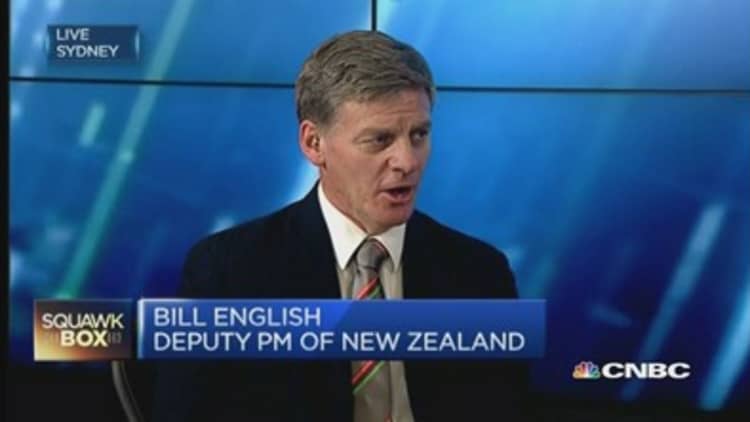The New Zealand dollar, a one-time market darling, could be on the verge of a sharp downturn, analysts are warning as the country's central bank flagged possible rate cuts.
"It's a pretty clear sell," said Sean Callow, senior currency strategist at Westpac Bank. He expects New Zealand's dollar, often called the , will fall to $0.71 in the next few months from around $0.76 in Thursday trade.
The currency got whacked in early Thursday trade, falling 0.7 percent after the Reserve Bank of New Zealand (RBNZ) warned it could lower rates if economic demand and inflationary continue to ease. It also described the kiwi dollar as "unjustifiably and unsustainably high" in terms of New Zealand's long-term economic fundamentals.
It's all about monetary policy divergence again, said Callow.

"Whereas before there was a risk of RBNZ remaining on hold and the Federal Reserve hiking rates, now it's a case of the RBNZ preparing for a rate cut as the Fed readies to hike rates," he said.
That's a clear policy shift for New Zealand's central bank, which raised rates four times last year by a total of 100 basis points. The official cash rate currently stands at 3.5 percent.
While the RBNZ has said since last year that the kiwi is too strong, it has not had much success in getting traders on board with its message.
Read MoreNew Zealand's top economic risk is Australia: PM Key
"The market got used to RBNZ complaining about the currency," said Callow. But now with a clear threat of a rate cut, "the market will take this and run with it" for a while, he said.
Rate cut: done deal?
A rate cut isn't a done deal, with the consensus among market watchers currently expecting the RBNZ to hold rates, but those in the easing camp expect a move before year-end.
Despite the RBNZ staying on hold at its meeting Thursday, the shift to an implicit loosening bias "supports our view that interest rates will be cut from the current 3.5 percent to 3.0 percent by the end of the year," said Paul Dales, chief Australia and NZ economist at Capital Economics. He expects the kiwi could fall to around $0.70.
Dales believes the RBNZ's willingness to tolerate a very low inflation rate is fading.
Read MoreNew Zealand govt, central bank clash on housing
"If we're right in expecting economic growth to slow this year, then the RBNZ will have little choice but to reduce interest rates in order to boost core inflation. After all, if core inflation is less than 1 percent when economic growth is above 3 percent, how low will it get if growth slows closer to 2 percent," he asked.
While New Zealand's economic growth has been stable in recent years, underpinnedby tourism, construction activity and net immigration, the country faces headwinds from lower dairy incomes, lingering drought effects, fiscal consolidation and neighboring Australia's slowdown.
Nevertheless, not all are persuaded the central bank will pull the rate-cut trigger at all.
"We are not convinced that the RBNZ's easing conditions will be met, but this is a risk," UBS senior economist Robin Clements said in Reuters report on Thursday.
"Inflation may not rise as far, or as fast, as previously anticipated, but we see the most likely outcome as a longer period of policy on hold," Clements said.


